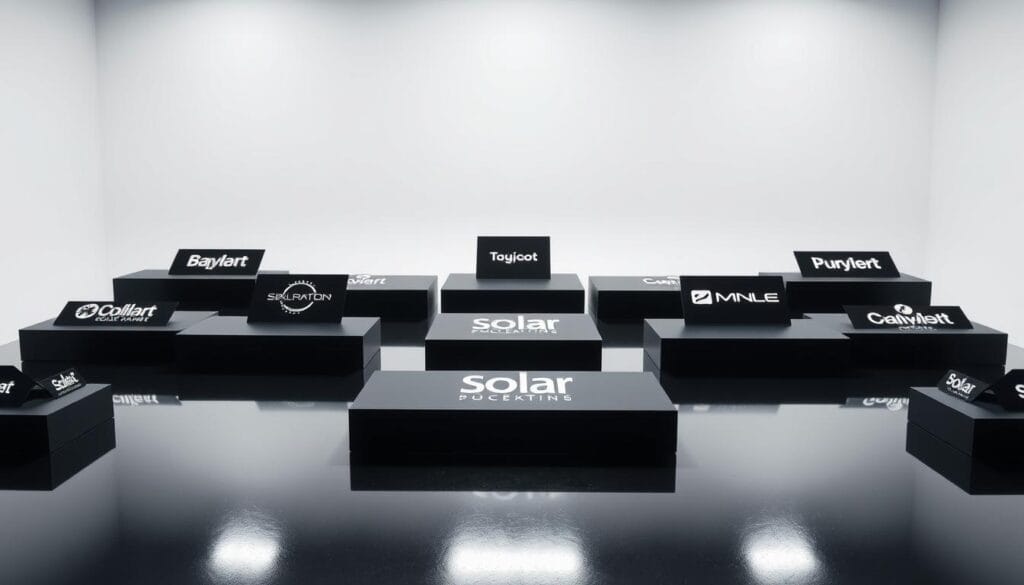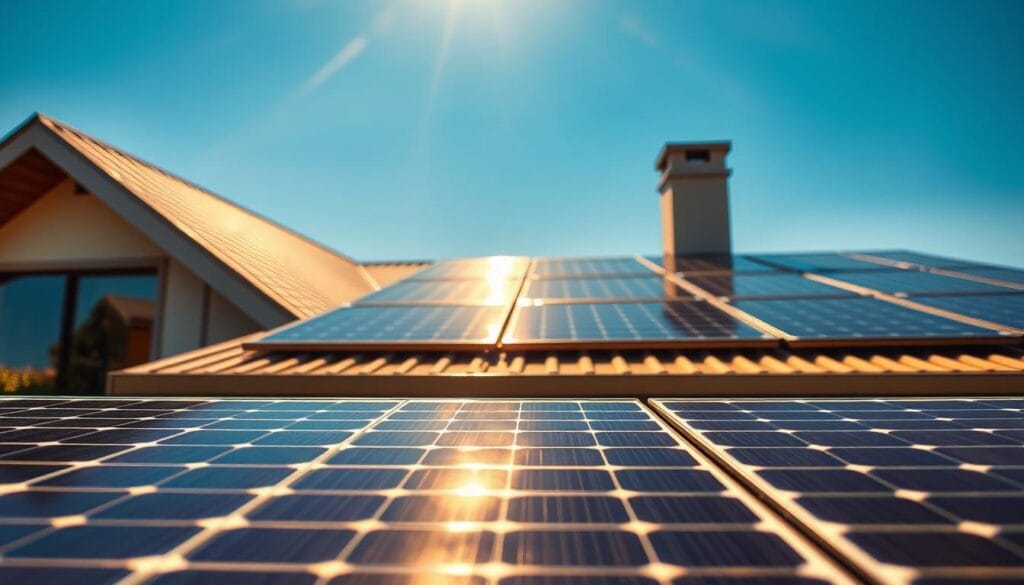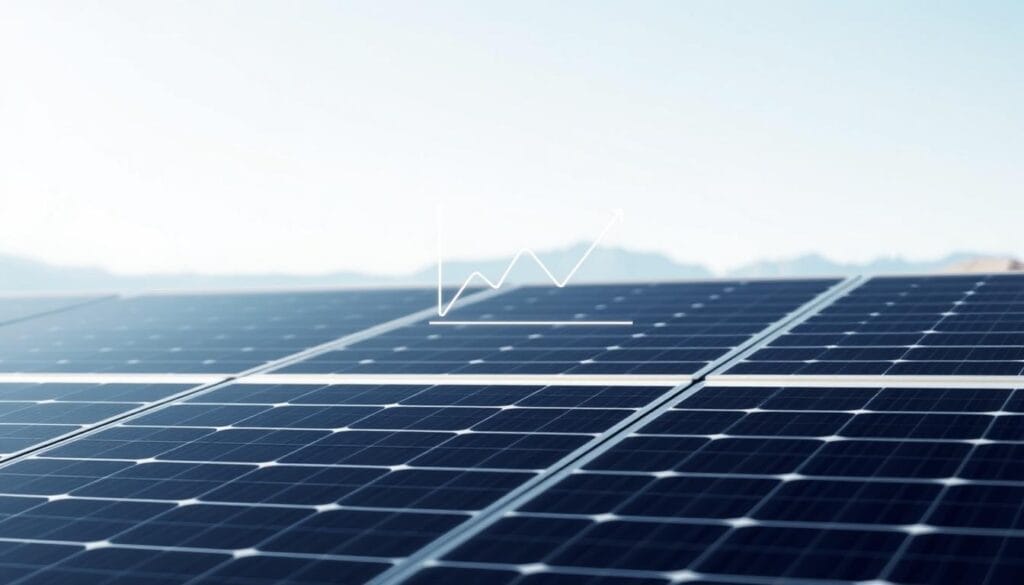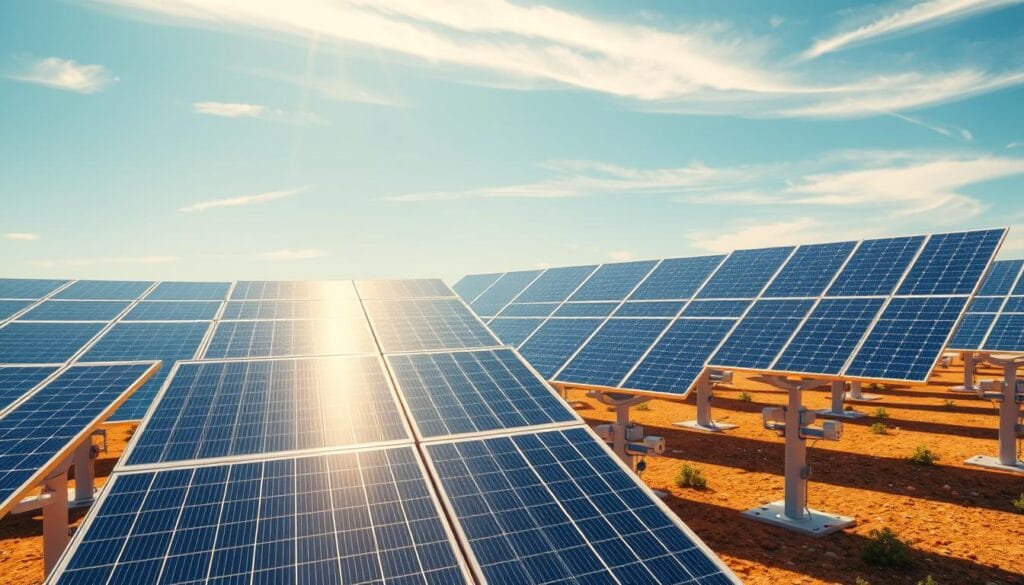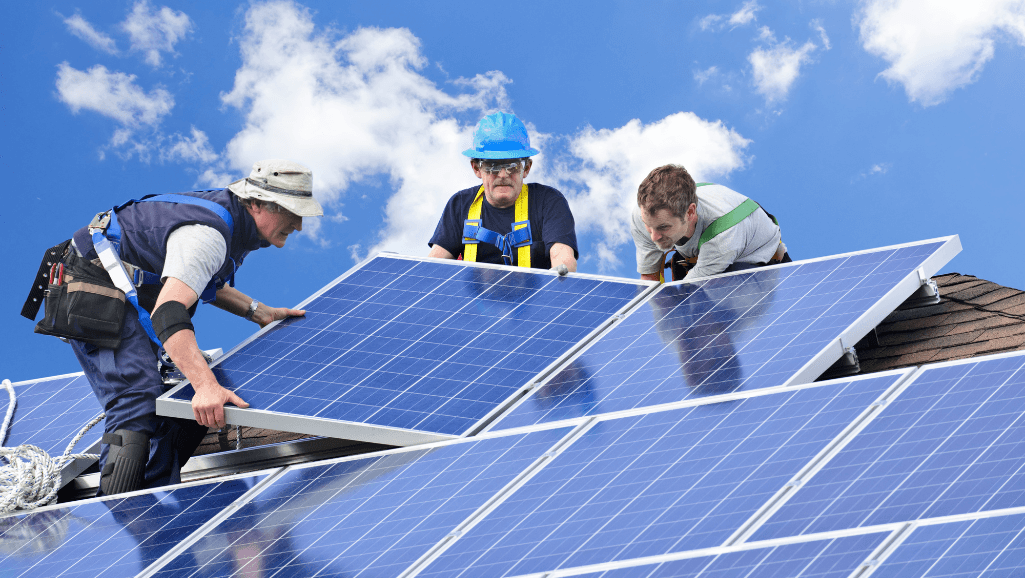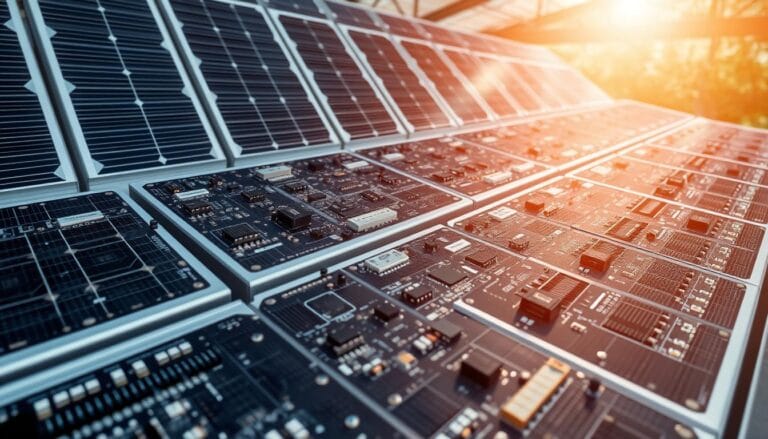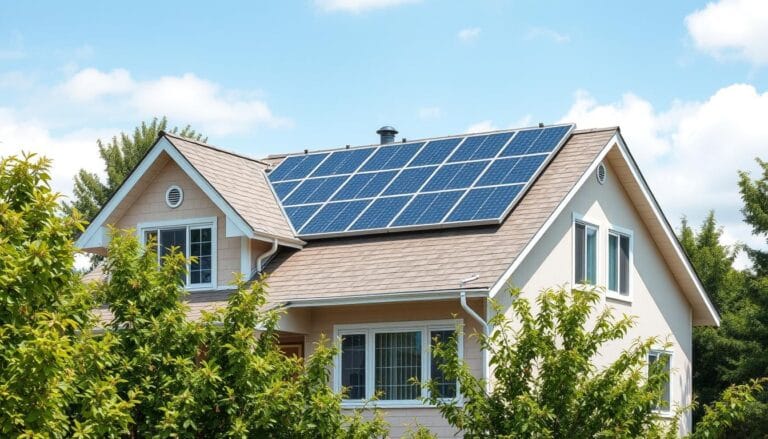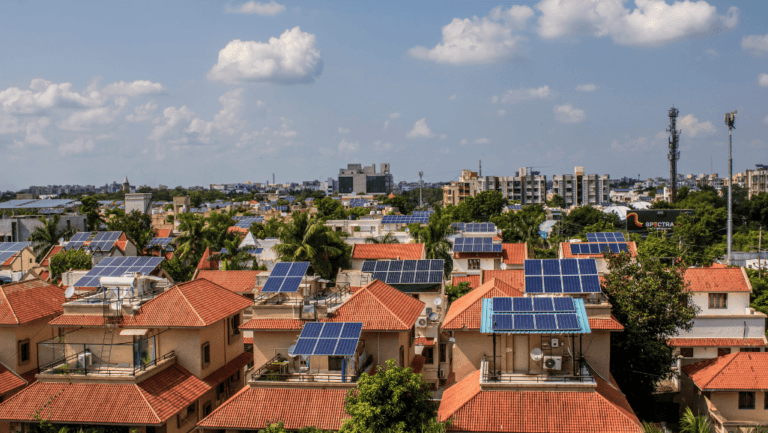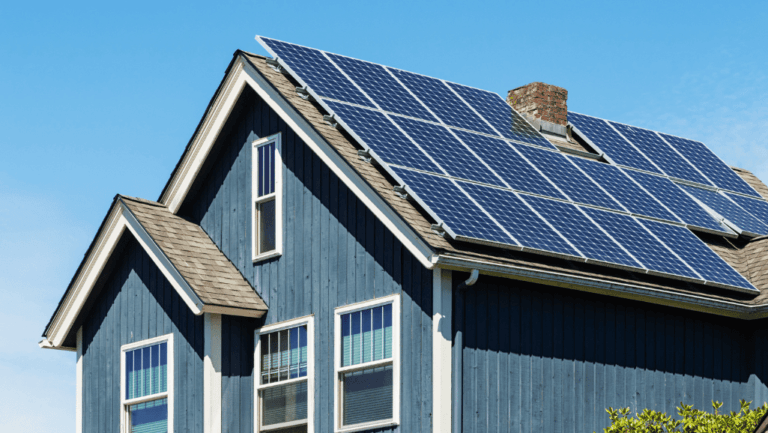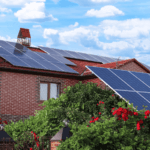This guide spotlights the panels and brands homeowners trust in 2025. We rank Canadian Solar, JA Solar, Qcells and other leaders using a 50-point system that blends efficiency, warranty, company strength, U.S. investment and market share.
Expect clear takeaways: learn how panel efficiency maps to real rooftop power, why Elite and Excellent ratings matter, and how long-term company stability supports warranty promises.
We strip specs down to outcomes—estimated output, likely bill savings, and usable capacity in tight spaces. You’ll also see why temperature and real-world conditions change production over decades.
Use this commercial-intent roadmap to compare quotes, weigh editor picks, and choose equipment and installers with confidence this year.
Key Takeaways
- best solar panels for homes.
- Top-ranked brands include Canadian Solar, JA Solar, Qcells, Silfab and Jinko.
- Ratings (Elite, Excellent) reflect performance plus financial and market strength.
- Small efficiency gains can add meaningful energy and cost benefits over time.
- Warranty value ties to company stability and U.S. presence.
- Compare output, aesthetics, and warranty to match your budget and roof size.
Why homeowners are choosing residential solar now
Today’s homeowners pick residential systems to lock in lower energy bills and clearer long-term returns. Short payback horizons, stronger warranties, and clearer ratings make the choice easier this year.
Commercial intent: how to compare quotes and move from research to install
Start by ranking priorities: efficiency if roof area is tight, value per watt if budget matters, or premium performance if you want top output. Then request at least three proposals.
- Ask each installer to list exact panel model numbers, product and performance warranty terms, and expected annual production.
- Compare total system cost alongside estimated output to judge lifetime value, not just sticker specs.
- Confirm the team has 5+ years local experience, in-house crews, and strong reviews—installer quality often outweighs small panel differences.
Consider temperature and shading in proposals. Good installers will explain how local conditions and roof orientation change performance and delivery dates. Use a simple scorecard and a clear timeline to move from quote to permit to final PTO.
Editor’s quick picks: the top-performing panels at a glance
Here are our editor-picked models that deliver the strongest mix of efficiency, warranty and real-world output.
Best overall: Canadian Solar TOPHiKu6 All-Black
Canadian Solar ranks #1 (Elite) with the TOPHiKu6 All-Black. It balances high efficiency, trusted warranty terms, and broad U.S. availability.
Best value per watt: JA Solar DeepBlue 4.0
JA Solar (ranked #2 Elite) targets homeowners who want strong efficiency and high output while keeping system cost attractive.
Most popular with U.S. installers: Qcells Q.TRON AC
Qcells is offered by about 58% of installers nationwide. That market presence simplifies sourcing, service and consistent install quality.
Premium performance contender: REC Alpha Pure-RX
REC’s Alpha Pure-RX aims at buyers chasing higher conversion and robust degradation terms to protect long-term output.
“Each pick is backed by market adoption and recognized rating; these are proven leaders you can count on.”
- Typical top specs: roughly 23% efficiency and up to 470W output on leading models.
- When choosing, weigh efficiency alongside power output and warranty scope to match your roof and goals.
How we ranked the best solar panels for homes
We built a 50-point system that weighs technical tests alongside company stability and market reach.
Holistic scoring: performance, warranty, value, U.S. investment, market share
Performance (10 points) covers efficiency, temperature coefficient, and independent PVEL test results so rated output reflects real roofs, not marketing claims.
- Warranty (5): product and performance terms plus degradation limits.
- Company financials (10): revenue, growth, and net income to back long-term support.
- U.S. investment (7.5): domestic locations, manufacturing presence, and supply-chain commitments.
- Value (12.5): wholesale cost per watt to capture realistic cost and positioning.
- Market share (5): installer data and survey insights that reflect sourcing and service ease.
What “Elite” and “Excellent” ratings mean in real life
Our cutoffs map to practical outcomes: Elite ≥39, Excellent ≥34, Very Good ≥29, Good ≥24, Average ≥19.
“These ratings point to panels that deliver reliable annual production, backed warranties, and predictable cost outcomes over the year.”
Top brands roundup: strengths, trade-offs, and who they fit
These short brand notes highlight who shines at efficiency, who focuses on value, and who offers strong domestic manufacturing. Use them to match priorities—efficiency, price, installer reach, or U.S. content—against real product and warranty trade-offs.
Canadian Solar
Reliable, all-around choice: canadian solar scores as an Elite brand with up to 23% efficiency and 470W power. The company pairs strong product support with competitive pricing and broad market availability.
JA Solar
Value-driven performance: JA Solar delivers up to 23% efficiency and 460W output. This manufacturer focuses on cost-effective kits that still offer solid long-term performance.
Qcells
Installer-friendly: Qcells (22.5% efficiency, ~440W) shows up on many bids. Broad installer adoption means easier sourcing and smoother project execution.
Silfab & Jinko
Silfab: U.S. manufacturing and long warranties make it a fit for buyers who value domestic supply and durable product backing.
Jinko: Dependable value, 22.5% efficiency and 440W-class output suit budget-conscious owners who still want consistent performance.
Panasonic, REC, Trina
Panasonic: known for deep warranty pedigree. Note the April 2025 program discontinuation; the company has committed to warranty support for existing and in-progress installs.
REC: premium efficiency (up to ~22.6%) and robust warranties make REC ideal for small roofs where every percent of efficiency matters.
Trina: Vertex S+ balances value and mainstream efficiency with 25-year product and performance promises.
SEG & LONGi
SEG Solar: U.S. manufacturing momentum (Houston plant) can improve logistics and incentive eligibility while delivering ~22.3% efficiency.
LONGi: HiMo5 offers proven, affordable performance at roughly 21.5% efficiency—a steady choice across many installer offers.
“Match a brand’s strengths to your priorities—efficiency, price, domestic content, or installer familiarity—to find the right panel for your roof.”
Spec comparison that matters: efficiency, output, warranty, and cost per watt
Compare core specs that drive real rooftop production: efficiency, rated power and long-term degradation.
Top residential modules cluster around 21.5%–23% efficiency. That range balances advanced cell tech with proven reliability and steady annual delivery.
Typical rated power sits between 425W and 470W on standard module formats. Higher power output lets you add capacity without growing array area.
Performance guarantees usually limit annual degradation to about 0.25%–0.40% per year. Over decades, that difference matters more than small efficiency gains.
Pre-incentive pricing often falls near $2.94–$3.18 per watt. Final installed cost depends on installer overhead, roof complexity, and local permitting.
- Check the temperature coefficient on the datasheet—better coefficients keep more power under hot conditions.
- Compare product vs. performance warranty to see what workmanship and energy protection you actually get.
- Use the spec ranges to sanity-check quotes; outliers deserve extra scrutiny of assumptions and site conditions.
“Match efficiency percentage, rated output, degradation terms, and installed cost to make confident equipment choices.”
Efficiency explained: what a few percentage points change on your roof
Small shifts in module efficiency can change how much capacity your roof can host and how soon the system pays back.
Efficiency measures how well a panel converts sunlight into usable power. Gains of just a couple of points free up roof area and raise annual production without changing orientation or tilt.
Why N-type cells lead residential efficiency
N-type back-contact (IBC/XBC), HJT and TOPCon cell types reduce losses and push module efficiency beyond 23%. Leaders such as Aiko (~24.8%), Maxeon 7 (~24.1%) and LONGi Hi‑MO X10 (~24.0%) show what’s possible at scale.
Space-limited roofs: higher efficiency equals higher system capacity
When roof area is tight, higher efficiency directly increases installed kilowatts. That can shorten energy payback to ~1.5 years in many U.S. locations.
- Better partial-shade and temperature behavior boosts real-world panel performance.
- Top manufacturers (Aiko, Maxeon, LONGi, Jinko, REC, Canadian Solar) now ship modules above 23% at volume.
- Design matters: inverter and optimizer choices, layout and tilt determine actual energy delivery over years.
“A few percentage points of extra efficiency compound into thousands of kilowatt-hours over a system’s life.”
Temperature coefficient and real-world performance
Where your panels sit and how hot they get matters as much as their efficiency rating. A module’s temperature coefficient shows how much power falls away as cell temperature rises. Use this number to estimate real production under local conditions.
Hot roof impact: why a lower %/°C coefficient preserves power
Cell temps often run 20–30°C above ambient on a sunny roof. That makes the coefficient a practical lever on daily and annual power output.
Typical ranges: poly P‑type ≈ -0.39% to -0.43%/°C; mono P‑type ≈ -0.35% to -0.40%/°C; TOPCon ≈ -0.29% to -0.32%/°C.
N-type advantage: HJT and IBC shine in heat (-0.25% to -0.30%/°C)
N-type HJT and IBC modules lead thermal performance with coefficients near -0.25% to -0.30%/°C. That edge keeps more energy on hot afternoons and across the year.
- Hot rooftops are common; a lower temperature coefficient preserves usable production.
- Compare spec sheets side-by-side; manufacturers list coefficients to predict real conditions.
- NOCT (~45°C at 800 W/m²) helps model average performance, not just STC numbers.
- When efficiency figures tie, temperature behavior is often the deciding factor in hot climates.
“Pair thermally adept modules with ventilated racking to protect daily output and long-term energy yield.”
For a deeper technical read on how temperature affects module efficiency and output, see temperature vs efficiency.
Degradation over time: protecting output year after year
A tiny shift in yearly decline can change decades of electricity production. Many modern modules come with 25–30 year performance warranties. The lowest annual degradation rates sit near 0.25%–0.30%. Typical rates run up to about 0.40% per year.
What 0.25% vs 0.40% annual loss means over 25-30 years
Small percentages matter. A 0.25% annual loss preserves roughly 90%–92% of original output after 25–30 years. At 0.40% per year, retained output often falls into the mid‑80s percent range.
- Degradation is the gradual decline in panel output; lower annual loss preserves more lifetime energy.
- Performance warranty terms set the minimum production you can expect over warranty years.
- Lower‑degradation models often rely on N‑type cell tech and refined manufacturing to protect efficiency and power.
- Ask installers for model‑specific degradation curves to compare lifetime energy, not just nameplate power.
“Choose equipment and warranties that align with your long‑term load growth—EVs, heat pumps, and future needs.”
Warranty depth and the company behind it
Warranty length is only half the story—who stands behind it matters even more. Check both document length and the maker’s ability to deliver service when you need it.
Product vs. performance warranties: what’s covered and for how long
Product warranties cover workmanship and materials. Performance warranties guarantee energy delivery over many years.
Many top brands offer 25-year product and 25–30 year performance terms. Confirm the start date, transferability, and remedies like repair, replacement, or refund.
Why financial strength and U.S. presence matter
Company stability affects response time, parts availability, and claim handling. A strong U.S. presence usually speeds service and simplifies logistics.
- Ask who administers claims: maker, installer, or third party.
- Match warranty language to local conditions—wind, hail, humidity, and heat.
- Track program changes; Panasonic’s April 28, 2025 announcement shows why this matters.
“Choose deep warranty coverage backed by a financially solid company to protect long-term performance and peace of mind.”
2025 technology snapshot: where panel innovation is headed
Manufacturers are racing to lift per‑module power while improving thermal and degradation behavior. This year brings several lines that push residential efficiency well above historical norms, translating into higher production per roof area.
Residential leaders pushing 24%+
Aiko’s NEOSTAR 3P54 reaches about 24.8% efficiency, while Maxeon’s Gen‑7 tops ~24.1% and Gen‑8 aims to exceed 25% later in 2025. LONGi’s Hi‑MO X10 (HPBC 2.0) sits near 24%, with the EcoLife line targeting ~25% by year‑end.
Perovskite tandem outlook
Perovskite tandems are showing record cell and early panel results. Oxford PV hit a 26.8% cell record and supplied 24.5% panels to a U.S. project in 2024. Broad commercialization depends on proving long‑term durability, but pilot deliveries confirm the path.
- What this means: crossing 24% raises electricity output per square foot and helps tight roofs host more capacity.
- Expect limited early availability; wide production will scale over the next few years as the industry stabilizes new processes.
- Temperature and long‑term degradation remain critical—manufacturers are tuning cell tech and materials to protect year‑over‑year power.
“These advances point to stronger capacity on existing roofs, making current installs more future‑proof as higher‑efficiency lines scale.”
Installer selection beats panel selection: how to get it right
A skilled installer shapes how much energy your roof actually delivers over decades. Most long-term issues with rooftop systems come from inexperienced vendors, not from the module itself. Choose a local electrical contractor with proven field experience to reduce risk and speed permits.
Local, experienced, well-reviewed crews reduce risk and maximize results
Look for a company that has at least five years of PV work, in-house crews, and strong customer reviews. SolarReviews and industry guidance both favor firms that manage design, structural checks, and final inspections directly.
Quality workmanship protects performance and helps you use the full value of a product warranty. A mature company will anticipate permitting hurdles, utility interconnection steps, and common on-site issues.
- The installer you pick affects safety, long-term reliability, and real output more than tiny differences between panels.
- Verify licenses, insurance, and recent customer feedback to confirm consistent quality.
- Ask installers how they pair a panel and inverter to your roof, local climate, and energy goals.
- When problems arise, established companies resolve issues quickly and stand behind their work.
“Prioritize installers with demonstrated local experience and clear processes to turn module specs into dependable home energy.”
U.S. incentives and domestic manufacturing considerations
Recent domestic plant openings shift the calculus on incentives, supply chains, and service. U.S. manufacturing can unlock program eligibility and shorten lead times while lowering transportation footprints.
When domestic content can improve incentives and sustainability
Domestic production matters in practical ways. Brands that build capacity in the U.S. may make systems easier to qualify for certain federal or state incentives this year.
SEG Solar’s Houston plant (1 GW annual capacity, opened 2024) is a clear example of how local output improves availability and logistics. That can speed installs and help with parts and service.
Evaluate cost versus benefit: higher upfront cost may be offset by incentive gains, stronger warranty backing from a company with local presence, and shorter supply chains using responsibly sourced materials.
- Check current program terms—rules change year to year and can hinge on domestic content and materials origin.
- Ask your installer for required documentation to prove eligibility before signing a contract.
- Balance immediate cost with lifecycle energy value and sustainability goals.
USA-made panel options can simplify paperwork and support long-term service responsiveness.
Sizing for your home: area, wattage, and production targets
Start with usable roof area and a clear electricity goal. Measure the portion of your roof that gets sun, then set a target percentage of annual consumption you’d like the system to cover.
Translating roof area into system capacity with modern 430W–470W panels
Modern modules in the 430W–470W range let you pack more capacity into less area. That matters on small or oddly shaped roofs where every square foot counts.
Use high-efficiency panels to raise watts per square foot. Fewer modules simplify racking and can cut soft costs like labor and permitting.
- Begin with usable roof area and desired annual offset, then choose higher-efficiency modules to meet targets.
- 430W–470W modules reduce module count and often lower balance-of-system complexity.
- Translate efficiency into capacity: better conversion yields more power in tight layouts or shaded sections.
- Estimate real output using NOCT and local irradiance rather than STC alone to reflect actual temperature and site conditions.
- Size with headroom if you expect EV charging or electrification to avoid costly upgrades later.
- Confirm structural limits and racking that keep airflow and long-term durability while balancing aesthetics and performance.
“Measure your roof, set realistic output goals, then match capacity and efficiency to get the most from each square foot.”
Use cases: match the right panel to your priorities
Choosing equipment starts with a clear goal: maximize energy, preserve appearance, or fit tight space. Match each objective to module traits so the system delivers where it matters most.
Lowest LCOE seekers
Value-focused buyers should pick high-efficiency, value-leading models that lower lifetime cost per watt while keeping quality and warranty intact.
Aesthetics-first and space-limited roofs
All-black, high-efficiency modules keep clean lines and raise capacity in small areas. Confirm temperature behavior and degradation so appearance doesn’t cost long-term energy.
High-heat climates
Prioritize N-type HJT or IBC cells with low temperature coefficients (-0.25% to -0.30%/°C). These panels hold more power during hot afternoons and improve annual performance.
Balanced, harsh-condition, and future-ready buyers
- Harsh conditions: choose panels with proven durability and robust, explicit warranties.
- Balanced buyers: match strong efficiency with moderate cost and a reputable brand for dependable system performance.
- Future-ready: size slightly larger now if EVs or heat pumps are likely; pair with scalable inverters.
“Always cross-check your shortlist with installer availability to ensure chosen models are in stock and well supported.”
How to compare quotes the smart way
Treat each proposal as a checklist: equipment, modeled output, warranties, and assumptions. That approach turns complex bids into clear choices you can judge objectively.
Cross-reference installer recommendations with top-rated brands
Verify model names against our Elite and Excellent brand list. Confirm product and performance warranty lengths and stated degradation rates so long-term output matches expectations.
- Request line-item quotes that name the panel model, efficiency, rated power, degradation, and both product and performance warranty periods.
- Standardize comparisons using cost per watt, expected annual output, and modeled production under local conditions.
- Check that recommended equipment appears in the top 10 brands (Elite/Excellent) to ensure market adoption and serviceability.
- Evaluate the installer’s company stability, years in business (5+ years preferred), and customer reviews to reduce post-install issues.
- Ask for monitoring access in the proposal so you can verify real-time power and speed support if production dips.
- Scrutinize assumptions: orientation, shading, temperature, and inverter choice can materially change energy yield.
- Negotiate upgrades where it matters—lower degradation modules, stronger inverters, or extended workmanship warranty if quotes are close.
Pick the proposal that balances cost per watt, projected energy, brand reputation, and installer experience. That mix gives the most reliable outcome over decades.
“Standardize quotes, verify warranties, and choose an experienced company to turn panel specs into steady long-term power.”
Conclusion
The right combination of product, company strength, and installation determines decades of steady output.
You can pick from any Elite or Excellent brand with confidence. Score gaps across the 2025 top ten are narrow, and each delivers solid efficiency, reliable performance, and strong warranty backing.
Canadian Solar remains a proven all‑round choice, while several makers push toward 24%+ lines this year as the industry moves toward 25% and perovskite tandems mature.
Match panel traits—efficiency, temperature coefficient, and degradation—to your roof, climate, and goals. Then compare multiple quotes, standardize on cost per watt and modeled output, and prioritize an experienced installer who turns specs into real power.
Make your move with confidence: the market is healthy, options are proven, and the right pairing of product, company and installation will supply dependable home energy for years to come.



